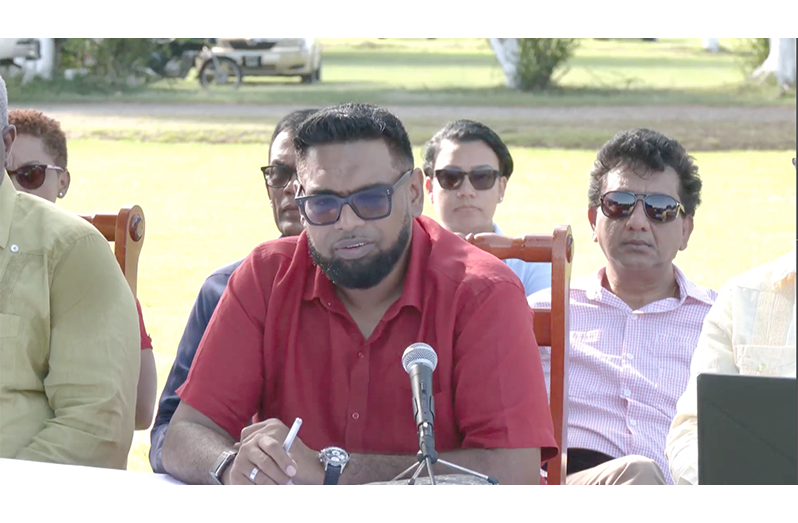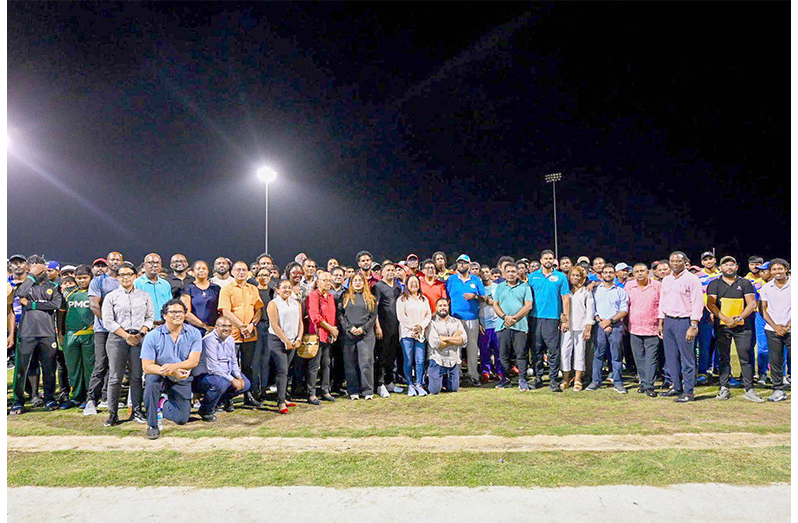— President Ali announces major cultural, recreational, and creative-industry expansion
PRESIDENT Dr Irfaan Ali on Friday unveiled plans to anchor Region Six’s future as a major orange-economy hub, announcing a wave of new cultural, creative and recreational facilities that will redefine community life and fuel the region’s long-term economic transformation.
Wrapping up two days of intense engagements across Berbice, the President said the Government is focused on building suburban communities where arts, entertainment, digital creativity and cultural expression flourish alongside traditional sectors, strengthening quality of life while supporting a modern, diversified economy.
“We have said that quality of life is important—family, women, children, the elderly must have safe areas that they can go for wellness or recreation for health reasons, and our communities must have good access to recreational facilities,” President Ali said.

TRANSFORMING SUBURBAN COMMUNITIES
Working in partnership with the Office of the First Lady, the government will now develop cultural and recreational facilities in 18 additional communities, complementing the ongoing projects in New Amsterdam, Brothers Village, Number 63 Village and Lonsdale. The next phase will include sites in the Polders, Parish, Cumberland, Kilcoy and Manchester villages.
Each location will feature play zones, creative activity areas and inclusive designs accessible to persons living with disabilities.
“These facilities will include play areas, areas that will stimulate creativity, adding to the orange economy… and will be friendly for those who require special assistance,” the President said. “We want every group in our community and in our region to enjoy these facilities.”
According to the President, the expansion of cultural and recreational infrastructure is already underway, with work progressing on dance studios, recording spaces and community facilities that support creative expression.
The Ministry of Culture, Youth and Sports has been tasked with accelerating this build-out, ensuring that every area of Region Six benefits from new green spaces, cultural hubs and modern sports amenities.
“Major work is already ongoing, the development of cultural spaces, creative spaces, in keeping with the holistic build out of the orange economy, dance and recording studios across the region and the building out of sports and recreational facilities across every area in this region, you will see a massive push power by this ministry in the building out of the orange economy in the coming weeks and months,” the President said.
On the sporting side, he pointed to the transformation of the Albion Sports Complex into a world-class cricket academy, a project that is expected to elevate training and development in the region and reinforce the Government’s heavy investment in sports infrastructure nationwide.
He also referenced the Palmyra Stadium, which is being developed as a multi-purpose venue capable of hosting cricket, other sporting disciplines, concerts and major entertainment events. Once completed, it will give Berbice the capacity to host international matches while serving as a major community and economic hub.
INDUSTRIAL TRAINING
Even as the creative sector takes centre stage, President Ali made it clear that other ministries are aligning their work to support Region Six’s rapid economic transformation.
He said the Ministry of Labour and Manpower Planning will intensify industrial training over the next five years to prepare residents for rising demand in machine operation, technical trades and other specialised skills expected to emerge from the region’s expanding industrial projects.
The ministry will scale up its Skills Connect job-matching services and broaden its recruitment and training programmes to ensure residents are positioned for the opportunities ahead.
According to the President, this expanded training push will ensure that the region develops the human capital necessary to meet the demands of future industries.
The President also reminded that Region Six is already earmarked by the Government’s 2025 PPP/C Manifesto as a future industrial capital, with plans to leverage its strategic location, emerging port network and natural gas reserves.
Several transformational projects are advancing, including the deep-water port, the new high-span Berbice River Bridge and the Corentyne River Bridge linking Guyana and Suriname. These projects, he said, will significantly enhance cross-border movement, expand regional commerce and strengthen Berbice’s role as a gateway for continental trade.
He further noted that the construction of several four-lane highways and the development of a municipal airport at Rose Hall are intended to improve logistics, mobility and investment readiness across the region.
To support this future industrial base, the Government will construct a second natural-gas pipeline in Berbice, mirroring the pipeline from the Liza field to Wales that currently powers the Gas-to-Energy project.
This new pipeline will help supply future refining, alumina processing, fertiliser production and petrochemical operations that the Government is working to attract. President Ali emphasised that with this wave of major projects, training and capacity-building will be essential.
Region Six already hosts one of the most modern technical training centres in the hemisphere, and a state-of-the-art Hospitality Training Institute is set to join it.
Together with the creative investments under the orange-economy plan, these facilities will position the region at the forefront of Guyana’s next phase of economic diversification.



.jpg)









